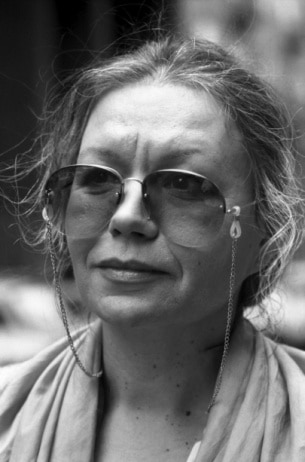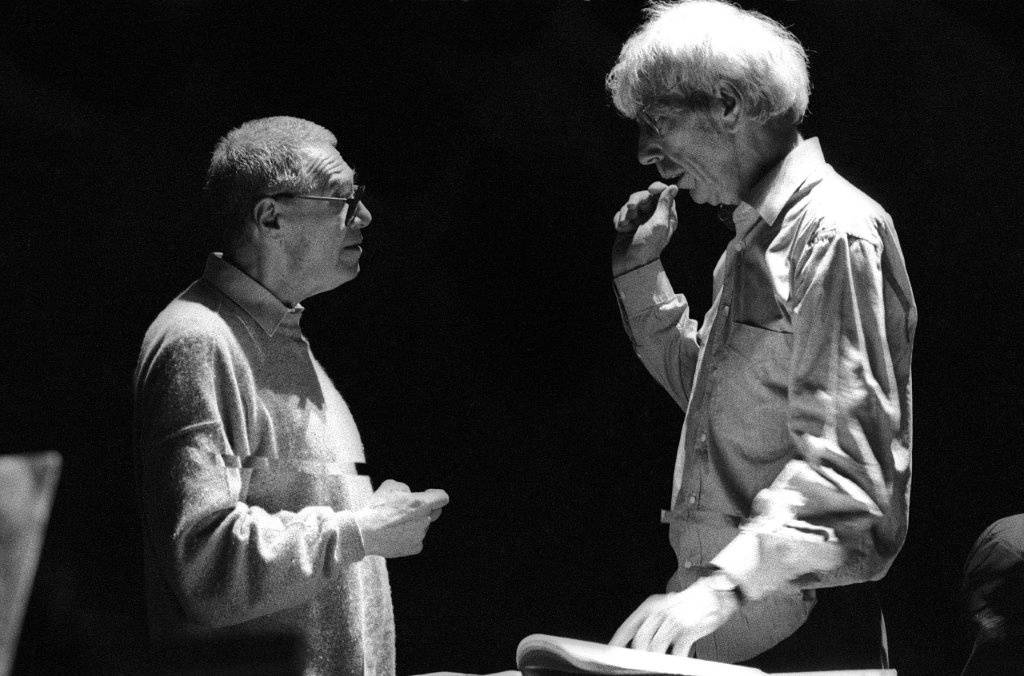Op 19 februari 2016 vierde György Kurtág zijn 90e verjaardag. Hoewel broos, werkt de Hongaarse grootmeester van zieldoorklievende noten nog altijd aan zijn eerste en enige opera, Fin du Partie (Endgame), naar het gelijknamige toneelstuk van Samuel Beckett. De proloog ging alvast in première tijdens een groots verjaardagsfestival aan de Liszt Academie in Boedapest waar hij ooit zelf studeerde. Donderdag 13 oktober presenteren Reinbert de Leeuw en het Asko|Schönberg een portretconcert rond Kurtág in het Muziekgebouw aan ’t IJ.
De eerste keer dat ik Kurtágs muziek hoorde was tijdens het Holland Festival van 1995. Het Schönberg Ensemble speelde onder leiding van Reinbert de Leeuw onder andere What is the Word, dat Kurtág componeerde voor de Hongaarse chansonnière Ildikó Monyók. Zij verloor haar stem bij een verkeersongeval, heroverde deze met veel moeite en stamelde een tekst van Beckett. Ze oogde nietig en kwetsbaar op het immense podium van de Grote Zaal van het Concertgebouw Amsterdam.

Ik zat aan mijn stoel genageld. De hoorbare moeite waarmee Monyók haar schorre, rafelige klanken produceerde bezorgde me koude rillingen. Onwillekeurig greep ik naar mijn keel, alsof mij persoonlijk het spreken werd belet. Ook Grabstein für Stephan, dat Kurtág componeerde voor een psychotherapeut die hem afhielp van een writer’s block maakte diepe indruk. Hoe schijnbaar simpel ook, de verwaaide arpeggio’s over losse gitaarsnaren waarmee het stuk opent slepen je onherroepelijk een verhaal in vol onuitgesproken angsten en onvervulde verlangens.
Innerlijke noodzaak
Het is – althans voor mij – onmogelijk niet geraakt te worden door de diepe innerlijke noodzaak van waaruit Kurtágs noten naar de oppervlakte borrelen. Enige tijd na het concert in het Concertgebouw liep ik hem toevallig tegen het lijf in het Planetarium van Artis. Spontaan drukte ik hem de hand en dankte hem voor zijn intense en expressieve muziek. Enigszins verbaasd en verdwaasd keek hij me door zijn grote brillenglazen aan. Met een enkel woord en een bedeesd knikje bedankte hij me voor mijn woorden, waarna hij zich schielijk uit de voeten maakte.
Anders dan zijn collega en landgenoot György Ligeti is Kurtág nooit een publiek figuur geweest. Hij is schuw en leeft teruggetrokken, zich honderd procent concentrerend op zijn muziek. Het concert van Asko|Schönberg op 13 oktober is een ode aan zijn indringende klankuniversum en vormt tevens het sluitstuk van een jarenlang project om al zijn ensemble- en koorwerken op te nemen voor cd. De box zal binnenkort verschijnen bij het avontuurlijke Duitse label ECM.
Tijdens het concert wordt een fragment getoond uit een filmportret dat Kurtágs kleindochter Judit van hem maakte. Gezien zijn schuwheid is het opmerkelijk en verheugend dat hij hiervoor toestemming gaf. Volgens het persbericht registreerde zij van zeer nabij hoe hij te werk gaat. Ook spreekt hij openhartig over zijn eigen worsteling om de juiste noten op papier te krijgen. Een document om naar uit te zien.
Van ultra zacht tot oorverdovend hard
Bijzonder ook is de uitvoering van Kurtágs Dubbelconcert opus 27 nr. 2 voor piano, cello en ensemble, dat vanwege het grote aantal musici niet zo vaak wordt gespeeld. Het opent met aarzelende, staccato gespeelde noten van de piano, waarop de cello antwoordt met vergelijkbare motieven. Gaandeweg mengen slagwerk en andere instrumenten zich in het betoog en dijt de bezetting uit tot veertien houtblazers, twee strijkkwartetten en twee koperkwartetten, die tot in de verste hoeken van de zaal staan opgesteld.
In dit ruim een kwartier durende dubbelconcert voert Kurtág ons door een enorm scala aan sferen, van ultra zachte verdroomde passages tot oorsplijtend luide tutti momenten. Naast vervreemdende, schijnbaar valse kwarttonen horen we ook flarden Beethoven en Oestvolskaja; er zijn zelfs wat jazzy momenten waarin het koper lekker uitpakt. Solisten zijn de pianiste Tamara Stefanovich en de cellist Jean-Guihen Queyras, die ook tekenden voor de cd-opname.

Kurtág wordt in een context geplaatst met muziek van Ligeti, Schönberg en diens twaalftoonskompaan Anton Webern. Vooral Webern zou een grote invloed op zijn manier van componeren hebben. Niet zozeer qua stijl, maar wel in de aforistische manier waarop hij zijn stukken aaneenrijgt. Met de vroege Schönberg heeft hij de expressionistische gevoelsuitdrukking gemeen, met de in 2006 overleden Ligeti deelt hij een liefde voor de volksmuziek van zijn geboortegrond Transsylvanië.
Zou de frêle Kurtág de reis vanuit Boedapest naar Amsterdam wagen om dit concert bij te wonen? Hij is een groot bewonderaar van Reinbert de Leeuw en was nauw betrokken bij de cd-opnames. Toen ik hem in 2011 sprak voor De Leeuws biografie loofde hij hartstochtelijk diens houding jegens zijn muziek:‘Hij LUISTERT!! Hem is de mening van de componist belangrijk. En niet alleen diens mening, maar ook het hoe en waarom van een stuk.’
Dus wie weet vereert Kurtág ons inderdaad met een bezoek, samen met zijn onafscheidelijke echtgenote Márta. Ik hoop vurig hem nog éénmaal de hand te mogen schudden.
